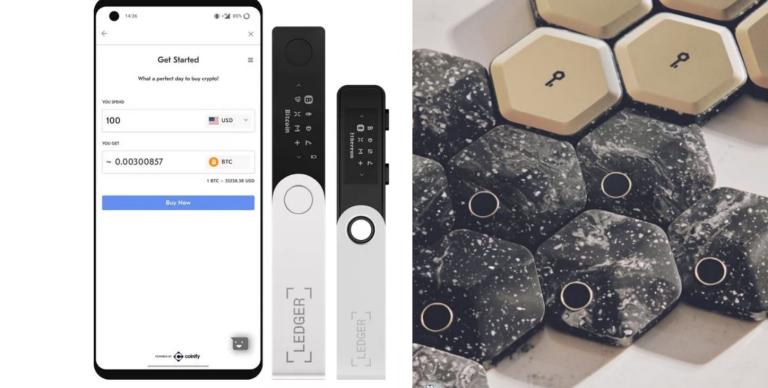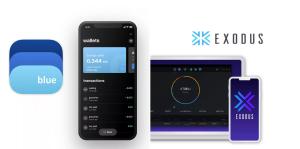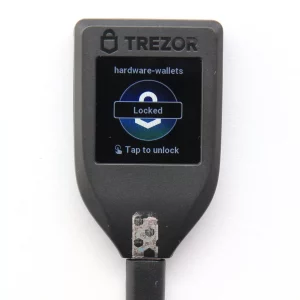Bitkey and Ledger are two notable hardware wallets offering secure Bitcoin storage with varying features, ease of use, and security mechanisms. Bitkey, launched in December 2023 by Block (formerly Square), focuses on multisig security and convenience, while Ledger is a more established player in the market with a history of secure, offline key storage.
How Bitkey Works
Bitkey is an open source hardware wallet that employs a unique three-key system to secure Bitcoin:
- Mobile Key: Installed on your phone and used for everyday transactions. It is backed up securely in the cloud for easy recovery.
- Hardware Key: A physical device used for larger Bitcoin transactions. It connects to your phone via NFC and requires your fingerprint or PIN for access.
- Server Key: Managed by Block, this key assists with recovery but cannot spend your Bitcoin alone. It adds a layer of security for lost or compromised devices.
Bitkey uses your fingerprint for secure access and connects to your phone via NFC, removing the need for a computer and reducing vulnerabilities. Larger transactions require both the phone and hardware key, ensuring Bitcoin security even if your phone is compromised.
Unlike Ledger and other traditional wallets, Bitkey doesn’t rely on complex seed phrases. You only need a PIN (or fingerprint) to unlock the hardware key, and setup requires minimal personal information. However, it’s important to note that at present, Bitkey wallets can only be restored on another Bitkey device and are not compatible with other wallet platforms, as they do not support the BIP-39 standard for mnemonic seed phrases.
With Mobile Pay, you can make small daily transactions directly through the app, setting a daily limit. Larger transactions still require hardware key approval but don’t affect the mobile limit. Bitkey also integrates with Cash App and Coinbase for buying and selling Bitcoin within the app.
Read also: Complete Review of Bitkey Wallet
How Ledger Works
Ledger offers three hardware wallets: Ledger Stax, Ledger Nano X, and Ledger Nano S Plus. Unlike hot wallets, Ledger lets you view your Bitcoin balance offline and access built-in exchanges to buy and sell Bitcoin. The wallets act like mini-computers, validating transactions internally to verify details like amounts and recipients.
During setup, you’ll create a PIN and a 24-word recovery phrase for security and recovery. To make transactions, connect the wallet to your computer via USB and use the Ledger Live app to send, receive, and track Bitcoin. While Ledger Live doesn’t support Liquid assets, you can manage them using your Ledger Nano S with Blockstream Green wallet.
Ease of Use
The integration between the mobile app and hardware wallet via NFC makes Bitkey simple to use for both beginners and experienced users. It’s designed to remove the complexity of seed phrases and transaction verification, replacing them with a PIN and fingerprint security. The multisig setup enhances security without sacrificing convenience.
While Ledger devices are secure, they require a bit more setup. You need to enter a PIN, store their 24-word recovery phrase securely, and connect to a computer or smartphone to manage transactions via the Ledger Live app. Nano X’s Bluetooth feature allows mobile connectivity, but setup and usage can feel more technical than Bitkey, especially for non-technical users.
Security
Bitkey emphasizes multisig security, which distributes your Bitcoin access across multiple devices. The hardware key uses fingerprint recognition for added security, and the server key provides additional recovery options. Bitkey is fully open source, allowing community verification of its code for potential vulnerabilities. This transparency enhances user trust, although some may be concerned about the centralized nature of the server key. However, the lack of BIP-39 compatibility limits recovery options to another Bitkey device, which could be a disadvantage for users accustomed to cross-platform recovery.
Ledger is known for its offline security. Storing private keys offline minimizes exposure to online attacks. However, Ledger’s security was questioned in May 2023 when they introduced the “Ledger Recover” service, which allows seed phrase backups. Some users feared this compromises privacy, as it shares recovery keys with external entities. Ledger is also proprietary software, which means users can’t audit the code themselves for hidden risks.
Price
Priced at $150, Bitkey offers a balanced feature set, particularly with its integration of multisig security and the absence of seed phrase requirements.
Ledger’s various models allow you to choose based on your budget and desired features, with Nano S Plus being the more budget-friendly option and Ledger Stax offering a premium experience.
- Nano S Plus: $79
- Nano X: $149
- Ledger Stax: $279
Fees
Transaction fees on Bitkey are fully user-controlled. Bitkey provides options for Priority, Standard, and Slow confirmations, allowing you to choose the speed and corresponding cost. You can also leverage Replace-by-Fee (RBF) to adjust fees for faster confirmations during network congestion.
Ledger does not charge any fees for sending or receiving Bitcoin beyond the standard blockchain network fees, which vary based on transaction priority. However, Ledger allows integration with exchanges for in-app trading, which may incur trading fees depending on the platform.
Bitkey vs Ledger Wallet: Quick Comparison
| Features | Bitkey | Ledger |
|---|---|---|
| Year Launched | 2023 | 2014 |
| Bitcoin Only | Yes | No (Bitcoin and altcoins) |
| Security Model | Multisig (Mobile Key, Hardware Key, Server Key) | Offline storage, PIN, recovery phrase |
| Connectivity | NFC (No cables required) | USB (Nano S Plus, Nano X) / Bluetooth (Nano X) |
| Integrated Apps | Cash App, Coinbase integration | Ledger Live app, third-party apps (MetaMask, etc.) |
| Backup | Cloud backup for Mobile Key | 24-word recovery phrase |
| BIP-39 (Ability to Restore Wallet on Another Wallet) | No | Yes |
| Open Source | Yes | No (Proprietary code) |
| Multisig | Yes | Yes |
| NFC | Yes | Yes |
| Replace by fee (RBF) | Yes | Yes |
| SegWit | Yes | Yes |
| Coin Control | No | Yes |
| Built-in Exchange | Yes | Yes |
| Duress Wallet | No | Yes |
| Supported Operating System | Android, iOS | Android, Linux, macOS, Windows, iOS |
| Price | $150 | Nano S Plus ($79), Nano X ($149), Ledger Stax ($279) |
Ledger vs Bitkey: Which One Should You Choose?
Bitkey is ideal for users looking for a balance between convenience and security. Its multisig setup and fingerprint-enabled hardware offer excellent protection without the need for complex recovery phrases. However, its reliance on Block’s servers for recovery may not suit purists who prefer complete self-custody. Additionally, Bitkey wallets can only be restored on another Bitkey device due to their lack of support for the BIP-39 standard, which limits recovery flexibility.
A trusted, longstanding player in the hardware wallet space, Ledger offers multiple models to suit different needs and budgets. While its security has been questioned recently due to the “Ledger Recover” service, it remains a popular choice for those seeking secure offline storage with versatile integration options.
As Bitcoin maximalists and open-source advocates, Bitkey is our pick, standing out as a compelling option for Bitcoin-only users. Launched in 2023, it is a Bitcoin-only wallet, aligning perfectly with those who prioritize Bitcoin’s principles and seek to avoid altcoin distractions. Bitkey’s open-source nature provides transparency and security, offering users confidence that its code can be audited by the community.
While Ledger has been a trusted name since 2014, its support for altcoins and use of proprietary code may not appeal to Bitcoin purists. Bitkey’s multisig security model, seamless NFC connectivity, and integration with major apps like Cash App make it both a user-friendly and secure choice. Despite lacking certain features like a duress wallet or coin control, Bitkey’s commitment to Bitcoin-only functionality and open-source transparency makes it an attractive solution for users who value these principles.
One consideration for potential Bitkey users is its current limitation to restoring wallets only on other Bitkey devices, which could be a disadvantage for those used to the flexibility of BIP-39-compatible wallets. Despite this, Bitkey remains a robust and innovative choice for Bitcoin-only enthusiasts.



























